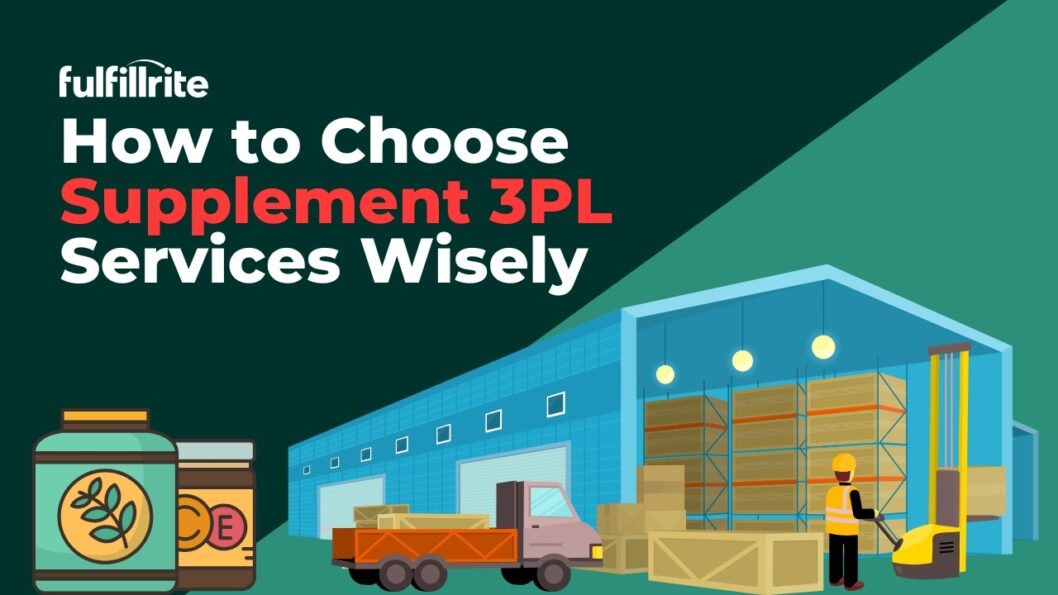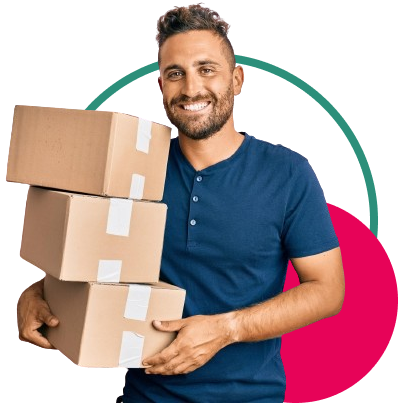If you’re selling supplements, choosing a fulfillment partner isn’t optional. It’s a make-or-break decision.
You can have the perfect formula, beautiful packaging, and solid demand. But if your shipping falls apart, your brand takes the hit. Customers don’t blame the warehouse. They blame you. And they don’t come back.
That’s why finding the right third-party logistics provider, your 3PL, is so important.
A 3PL handles your inventory after manufacturing. They receive it, store it, pick and pack orders, and ship to your customers. But supplements aren’t T-shirts or phone cases.
They expire. They melt. They get recalled. They need specific handling, and not every 3PL is built for that.
This article will walk you through how to choose supplement 3PL services that are equipped to do the job right, especially if you’re working with temperature-sensitive, perishable, or tightly regulated products.
And yes, Fulfillrite does this work every day. You can learn more about that here.
But this isn’t a sales pitch. This is a guide to help you avoid expensive mistakes and pick a partner who can grow with you.
What makes supplements different to ship and store
Shipping supplements isn’t like shipping socks. There are rules, risks, and a lot of room to mess things up.
1. Expiration and perishability
Supplements degrade. They don’t always fall off a cliff overnight, but time, heat, and humidity chip away at potency. Certain ingredients—probiotics, fish oils, gummies—are especially fragile.
That’s why fulfillment for vitamins and supplements needs to account for shelf life. Not just expiration dates, but also how long a product will actually perform as promised in varying conditions.
2. Temperature sensitivity
This one’s big. Not all supplements require climate control, but many do. If you’re working with oils, gels, or biologically active ingredients, you can’t risk your product sitting in a hot warehouse or baking in a delivery truck.
That’s where a climate-controlled 3PL for supplements matters. Room temperature isn’t enough. You need temperature stability. Spikes—up or down—can cause separation, spoilage, or label failures (yes, labels peel in heat).
If your fulfillment partner doesn’t monitor warehouse temps and humidity 24/7, you’re rolling the dice.
“It isn’t necessarily spoilage that is the concern,” says Jake Hyten, CEO of Superior Supplement Manufacturing. “It is degradation of potency of ingredients in their product, and therefore their label claim not meeting what they claimed if tested.”
3. Fragile packaging
Glass bottles. Powder-filled tubs. Blister packs. All of these can break, leak, or get damaged if packed poorly. And the customer doesn’t care if it was UPS’s fault. All they know is their vitamins arrived smashed.
That’s why you need a fulfillment center that knows how to ship fragile supplements. Bubble wrap and a cardboard box aren’t enough. You want people who know how to build protective kits around your products based on weight, movement, and shipping method.
4. Compliance
There are rules around how supplements are labeled, stored, and distributed. FDA inspections happen. Recalls happen.
And if your fulfillment center can’t keep up with documentation or batch tracking, you could be on the hook. And not just for refunds. We’re talking about legal exposure.
We’ll get into all that in the next sections. But the takeaway is this: how to handle temperature-sensitive inventory, and fragile, expiring goods? It’s not a nice-to-have. It’s the baseline.
How to choose a supplement fulfillment center
Not all fulfillment centers are the same. Some specialize in fashion. Others do tech accessories. A few—very few—are built for health products.
So if you’re wondering how to choose a supplement fulfillment center, start with what’s non-negotiable.
1. Climate control
Ask about temperature and humidity monitoring. Is it continuous? Is there backup power?
A climate-controlled 3PL for supplements should be able to show you what the inside of their warehouse feels like year-round.
2. Lot tracking
Supplements are produced in batches. If something goes wrong, you need to know which lot number shipped to which customer. A good lot tracking fulfillment center will scan every product in and out, and keep digital records tied to order numbers.
This is also how you stay compliant if the FDA or a retailer asks questions. If your 3PL can’t track lots, they’re not built for your industry.
3. FIFO/FEFO systems
FIFO = First In, First Out. FEFO = First Expired, First Out.
Both are important. You don’t want old product sitting around while fresh product ships. That’s a recipe for expired supplements reaching customers—and that’s a brand-killer.
Ask your 3PL how they manage this. Ask how they track expiration dates. And how they flag aging inventory.
4. Recall readiness
Even great brands get hit with recalls. Wrong label. Ingredient mix-up. Contamination at the source. It happens.
But if your 3PL can’t pull products by lot, or can’t stop outbound shipments immediately, you’ve got a serious problem. Supplement recall compliance fulfillment isn’t about fear—it’s about being ready.
5. Real-time inventory visibility
You should be able to log in, see what’s in stock, what’s aging, and what just shipped. If your fulfillment center doesn’t offer this—or updates it once a day—you’ll be flying blind.
So again: when asking how to choose a supplement fulfillment center, don’t lead with cost. Lead with capability. Saving a few cents per order means nothing if you’re refunding half your shipments due to spoilage or poor packing.
“Ask if the 3PL has experience with your type of product (since a good logistics partner will admit their specialties and limits),” says John-Paul Andersen, Ph.D. and Chief Science Officer at Phi Health. “It’s also crucial to ask about their performance metrics (order accuracy rates, typical delivery speeds), how they handle returns and lot traceability, and whether they can scale with your growth without surprise fees or capacity issues.”
What is lot tracking in supplement logistics?
Lot tracking sounds technical, but it’s simple in practice. Each production batch of your supplement gets a unique number—a “lot.” That number ties every bottle or box to a specific run. And your 3PL should know exactly where each lot went.
So what is lot tracking in supplement logistics, really?
It’s the backbone of traceability.
Here’s how it works:
- Your manufacturer assigns a lot number to a batch of finished goods.
- When those goods arrive at your fulfillment center, they’re received and logged by that lot number.
- As orders go out, each one is scanned and matched to the corresponding lot.
- If you ever need to recall a batch, or analyze returns tied to a particular lot, the data is already there.
This isn’t just helpful—it’s often required. If you sell through Amazon or retail distributors, they may ask for full traceability documentation. And the FDA definitely expects it if anything goes sideways.
A lot tracking fulfillment center doesn’t just write numbers down—they manage the system digitally. That means faster recalls, better analytics, and a much lower risk of shipping the wrong thing to the wrong person.
Bonus: it’s not just for emergencies
Lot tracking also helps you spot trends. If you notice higher returns from one batch, or a spike in complaints about taste or texture, you can trace it back to a specific run. That’s how you improve quality and build customer trust over time.
So yes—supplement recall compliance fulfillment is a worst-case scenario. But lot tracking is also about being a better operator day to day.
Regulations and compliance
When you’re in the supplement space, you’re in a regulated industry. Not in the same way as pharmaceuticals—but regulated all the same. And if your fulfillment partner doesn’t understand that, they can get you in trouble fast.
FDA compliance starts with labeling
Your labels must follow strict formatting rules from the FDA. That includes supplement facts, ingredient listings, health disclaimers, and the correct wording for structure/function claims.
It’s your responsibility, but a good fulfillment partner will flag if something seems off—especially if they’ve worked with other brands in your category.
Shipping regulations matter, too
Supplement shipping regulations in the USA vary based on what you’re selling. Some ingredients raise red flags with certain carriers. Others can’t ship via air. Some states restrict specific ingredients, so you need a system to block orders from those zip codes automatically.
If your 3PL just uses default UPS or USPS settings without adjusting for your product’s specifics, you’re exposed. Plain and simple.
Temperature and spoilage risk
We’ve already talked about how to handle temperature-sensitive inventory, but here’s the part most people skip: once it leaves the warehouse, your product is at the mercy of the supply chain.
Hot trucks. Delayed deliveries. Cold snaps. A product that sat perfectly for six months in storage can still arrive ruined if the packaging wasn’t designed to survive the last mile.
That’s why it’s not enough to pick the right 3PL—you also need to talk with them about how to prevent supplement spoilage in transit. That means thinking through things like:
- Thermal mailers or insulation
- Ice packs or cooling agents for specific SKUs
- Flagging “do not ship” dates in extreme weather
- Avoiding ground shipping in certain zip codes during hot months
The more your 3PL understands these dynamics, the fewer ruined bottles you’ll be refunding in August.
Why Fulfillrite is the best 3PL for supplement brands
Here’s the part where we explain why we’re confident in saying this: Fulfillrite is the best 3PL for supplement brands that care about getting things right.
We’ve done this for years. We’ve seen every issue that can go wrong in supplement fulfillment—from misaligned expiration tracking to melted gummies to unlabeled batches that triggered recalls. And we’ve built our system around avoiding those problems before they happen.
Temperature-sensitive goods? Covered.
Our warehouse is climate-controlled, with consistent temperature and humidity monitoring year-round. If you’re shipping something sensitive—like softgels or probiotics—we can help you preserve stability without needing expensive cold-chain infrastructure.
Inventory tracking that’s accurate and detailed
We track inventory at the lot level, with support for FIFO inventory management for supplements, and FEFO where needed. That means the right product goes out every time, and you never send something near expiration without knowing it.
Real-time visibility and proactive alerts
Our software connects to your store, updates in real-time, and shows you what’s happening as it happens. You’ll know what sold, what’s running low, and what’s aging—without having to email anyone for a report.
Dedicated support
You’re not going through a generic help desk. You’ll have an actual account manager—someone who knows your product, your business, and your fulfillment goals. When you grow, we help you grow smarter.
Built for scale
From subscription boxes to Amazon prep, from one SKU to 50+, we’re built to support you as you scale. And we’ll never make you feel like you’re “too small to matter.”
So if you’ve been trying to figure out where to turn—or if your current 3PL doesn’t feel quite up to the task—consider this your open door.
If you’d like to learn more, you can request a quote here. It’s a quick form, we know you’re busy!
Final Thoughts
Choosing the right 3PL isn’t just about picking someone who ships fast or charges less. For supplement brands, it’s about protecting the integrity of your product, meeting regulatory standards, and delivering a consistent customer experience every time.
You need:
- Climate control
- Lot tracking
- Expiration visibility
- Recall readiness
- Inventory accuracy
- Real human support
Fulfillrite brings all of that—and more—to the table.
If you’re ready to stop guessing and start building a fulfillment system that actually supports your business, reach out. We’ll walk you through what it takes to do it right.
No pressure. Just the facts. And a warehouse full of people who take this stuff seriously.

